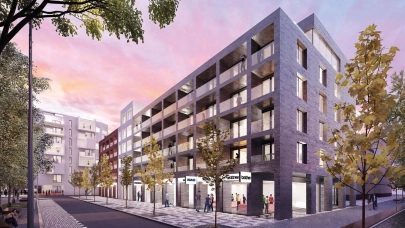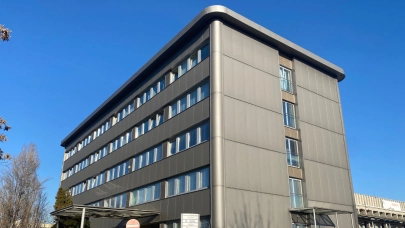
Monia Dobrescu, Partner, Mușat & Asociații spoke to Property Forum about the financing environment for the real estate sector in the context of the crisis in Ukraine and the law firm’s development plans for this year. The uniform application of the regulatory acts in the field is an issue that has an impact on players in the real estate market, and progress is being made in this area, Monia adds.
This interview was first published in Property Forum’s annual listing of "The 50 most influential people on Romania’s real estate market”.
How has the real estate client portfolio of Mușat & Asociații evolved over the last year and what are your objectives until the end of 2022?
Despite the restrictions imposed by the health crisis and the social and economic changes brought by it in 2021, our real estate team dealt with new mandates, some of them unexpectedly interesting and complex. We are happy to see that many of our clients are continuing with their real estate expansion and development plans. They are carrying on with construction, making property acquisitions and entering into strategic partnerships to support business development. This year, we aim to increase our client portfolio and support those who are undeterred by the effects of the crisis and the rather difficult market conditions. Our team has the necessary experience and a good interdisciplinary collaboration with the other departments involved (litigation, tax, environmental law, banking law, corporate), which allows us to advise on a wide range of mandates with challenging legal issues.

Monia Dobrescu
Partner
Mușat & Asociații
What are the development prospects for real estate clients following the removal of restrictions imposed in the wake of the health crisis?
Real estate has always been an area of interest, while the Romanian real estate market still has a lot to offer and remains attractive to investors. In addition, it has proven to be a mature market, with players who even in the midst of the pandemic have managed to cope with the needs of their clients and keep on an upward trend, though in certain cases this resulted in a “reinvention of their business”. Some sectors were particularly affected, such as the office area, in the context of the unpredictability of the pandemic’s evolution and the shift towards remote work. The removal of restrictions can only be a positive element. It remains to be seen whether the conflict in the region will also have a negative impact on the real estate market, after already affecting several sectors and leading to higher energy and raw material prices.
What does the financing environment for real estate companies look like at the moment? When do you expect to see an impact on the market following the key interest rate hike?
We have ongoing real estate financing projects, including new mandates, so we can confirm there is still an appetite to invest in real estate, despite the rise in interest rates or the price of building materials. The financing environment continues to be stable for real estate companies, although the growth of financing for this business area is showing signs of slowing down in the context of the crisis in Ukraine. However, the market is behaving maturely and the impact of economic changes is not exaggerated.
What financing alternatives do local real estate developers have besides bank credit?
The preference of local investors for traditional bank credit financing is still visible, but there has been an increasing diversification of financing methods in recent years. Thus, whether we are talking about public offers, attracting European funds, participating in various government programs with an impact on the real estate sector or even crowdfunding, we notice an openness in this direction on the part of the Romanian entrepreneurial environment. At the same time, projects with an impact on everything digital have become increasingly common over the last few years and the latest socio-economic developments have certainly accelerated things. This is a time of innovation, but also of an increase in popularity of the tools that have been on the market for some time.
Is inflation a factor taken into account by real estate companies that want to start new investments in Romania?
Inflation is definitely a factor to be taken into account by real estate companies that want to start new investments in Romania. However, we should not neglect the fact that most European countries are facing inflation at this time, especially in this European region, and Romania makes no exception. It is true that the initiative of running “new money” was affected during the pandemic period, which was a time when greater caution was displayed, and we still feel a reluctance in the current economic and socio-political context.
What has been the most complex project you have worked on in the last year as a legal expert?
In the last year, we have had a number of complex real estate projects, and it would be difficult to rank them by complexity. There are a few that would be worth mentioning from this perspective, such as the acquisition of a piece of land that was conveniently located for our client’s development plans, but the deal was complicated however by public utility investments in the area, a project for which we teamed up with our colleagues in the environmental law and litigation departments; the sale of an important real estate asset, through a complex contract with a number of conditions precedent to be fulfilled, some of which relate to regulatory and environmental law issues; the setting up of a strategic partnership between two real estate developers and the sale by our client Catted, a Romanian logistics and warehousing company, of the logistic Business Park Chitila to the real estate developer Globalworth.
How will the crisis in Ukraine influence the local real estate investment transaction market?
After the upward trend of real estate investment transactions in the local market in the last years, such a crisis in the region is expected to be a brake on economic growth. The regional economic impact is certainly substantial, if we think, for example, of the disruption of trade chains, which has led to supply difficulties and increases in commodity prices. However, an initial shock has been overcome and the outlook is not necessarily bleak. Given past experiences with the economic and health crises, market players are acting more cautiously. However, it is difficult to predict the medium and long-term economic effects.
How can Romania attract more institutional investors in the real estate sector, especially in the residential segment?
A prosperous business environment thrives in conditions of political and legislative stability. The same applies to the real estate sector, where stability and transparency, especially in the fiscal area, are essential. Equally, it is extremely important to uniformly apply the legal framework, as the lack of uniformity leads to difficult, unreasonable situations that make it difficult for businesses to develop. Last but not least, celerity in response from the authorities, especially in the urbanism field, would be extremely welcome. For a real estate investor, it is difficult to draw up a business plan knowing that it will take at least six months to a year to get all the necessary approvals for a building permit, for example.
What are this year’s expectations of developers when it comes to the Urban Zoning Plans (PUZ) in the capital? Is there a risk of blocking new large-scale investments?
Unfortunately, the PUZ situation is becoming a lingering problem, as last year we were discussing the same issue. In the meantime, some PUZs have been suspended again, others cancelled. The individual administrative acts that rely on the PUZs should not be, in principle, affected by their cancellation. However, we all want the situation of the PUZs to be clarified as soon as possible, considering that any large-scale investment is made with the limitation or even elimination of unknown variables.



